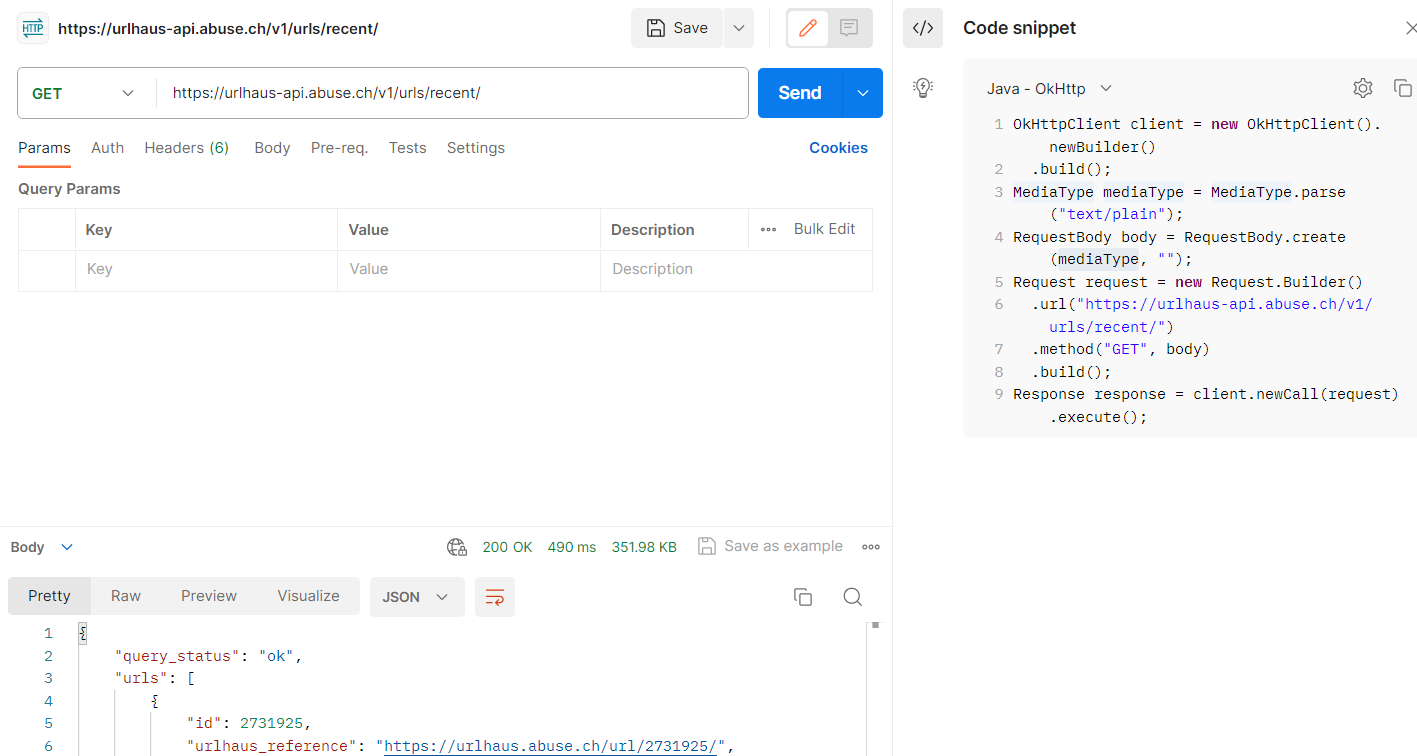OkHttp3 Scripting Postman can help you generate HTTP call code in Java, cURL, and many other languages. This is a fast way to perform scripting in Java, especially for batch processing requirements.
One use case I encountered involved firing 50,000+ HTTP calls while reading input from a CSV file. While such use cases are often better suited for SQL or PL/SQL, you may not always have access to the persistence layer.
Dependencies Add okhttp3 and commons-lang3 (for ExceptionUtils) to your pom.xml:
<dependency>
<groupId>com.squareup.okhttp3</groupId>
<artifactId>okhttp</artifactId>
<version>4.12.0</version>
</dependency>
<!-- Optional -->
<dependency>
<groupId>org.apache.commons</groupId>
<artifactId>commons-lang3</artifactId>
<version>3.12.0</version>
</dependency>
Code Snippet from Postman You can generate the following OkHttp3 code snippet using Postman:
OkHttpClient client = new OkHttpClient().newBuilder()
.build();
MediaType mediaType = MediaType.parse("text/plain");
RequestBody body = RequestBody.create(mediaType, "");
Request request = new Request.Builder()
.url("https://urlhaus-api.abuse.ch/v1/urls/recent/")
.method("GET", body)
.build();
Response response = client.newCall(request).execute();
Processing a File with Files.lines Let's process a file in the format A;B;C, where we only need columns B and C. Here's an example input:
xxxx;B0;C0
xxxx;B1;C1
xxxx;B2;C2
xxxx;B3;C3
Batch Processing Code
// Append to output file names to distinguish multiple runs
LocalDateTime ldt = LocalDateTime.now();
DateTimeFormatter formatter = DateTimeFormatter.ofPattern("yyyy-MM-dd--HH-mm-ss");
public void batch() throws IOException, URISyntaxException {
Files.lines(Path.of(getClass().getResource("/input.txt").toURI()))
.parallel()
.forEach(l -> {
try {
this.process(l.split(";")[1], l.split(";")[2]);
} catch (URISyntaxException | IOException ex) {
log.info("IO exception trace: " + ExceptionUtils.getStackTrace(ex));
ex.printStackTrace();
}
});
}
process Method
void process(String x, String y) {
log.info("Processing x: " + x + ", y: " + y);
try {
OkHttpClient client = new OkHttpClient().newBuilder()
.build();
MediaType mediaType = MediaType.parse("text/plain");
RequestBody body = RequestBody.create(mediaType, "");
Request request = new Request.Builder()
.url("https://urlhaus-api.abuse.ch/v1/urls/recent/")
.method("GET", body)
.addHeader("x", x)
.addHeader("y", y)
.build();
try (Response response = client.newCall(request).execute()) {
log.info("Current response: " + response);
String respBody = response.body() == null ? "" : response.body().string();
if (response.isSuccessful()) {
String str = "xxxx;" + x + ";" + y + ";" + response + ";" + respBody + System.lineSeparator();
log.info("Operation succeeded for x: " + x + ", y: " + y);
Files.writeString(Paths.get("logs", "success-" + formatter.format(ldt) + ".txt"), str, StandardOpenOption.APPEND, StandardOpenOption.CREATE);
} else {
String str = "xxxx;" + x + ";" + y + ";" + response + ";" + respBody + System.lineSeparator();
log.info("Operation failed for x: " + x + ", y: " + y);
Files.writeString(Paths.get("logs", "failure-" + formatter.format(ldt) + ".txt"), str, StandardOpenOption.APPEND, StandardOpenOption.CREATE);
}
}
} catch (Exception ex) {
log.info("Operation failed for x: " + x + ", y: " + y + ", exception: " + ex.getMessage());
log.info("Exception trace: " + ExceptionUtils.getStackTrace(ex));
String str = "xxxx;" + x + ";" + y + ";" + ex.getMessage() + System.lineSeparator();
Files.writeString(Paths.get("logs", "failure-" + formatter.format(ldt) + "-" + ".txt"), str, StandardOpenOption.APPEND, StandardOpenOption.CREATE);
ex.printStackTrace();
}
}
Best Practices PS : Remember, this is scripting with Java for quick actions. Follow these best practices:
Avoid string concatenation with the + operator.
Avoid catching the parent Exception class. Handle exceptions properly.
Avoid repeating code blocks, such as file I/O operations.
Sanitize input, as a 50K+ input file is unlikely to be clean.
Use verbose logging to understand what went wrong.
Handle NullPointerExceptions (NPEs).
Ensure your API gateway, backend, and API key can handle the expected load.
Calculating Queries Per Second (QPS) Assuming:
Each thread in the common thread pool can handle 2.5 queries per second (1s / 400ms). With 10 cores, you can send approximately 25 QPS (2.5 * 10).
To process 50,000 queries at 25 QPS:
50,000 queries / 25 QPS = 2,000 seconds ≈ 34 minutes
Ensure your system can handle this load!
18 February 2026
